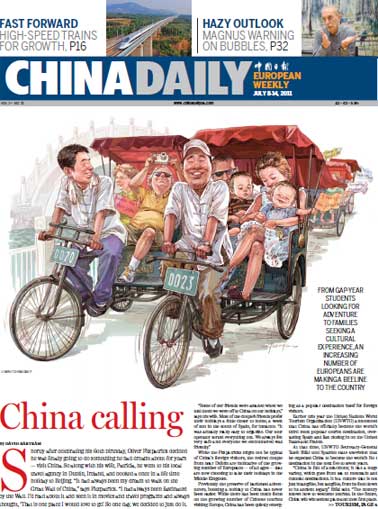Future of travel: Sustainability
Updated: 2011-07-08 11:03
By Thomas Bauer (China Daiy European Weekly)
Tourism policy needs to map out viability, environmental issues
Academic tourism research often follows what is happening already and investigates existing phenomena, but it should look to the future and lead the way so that industry and governments can make better decisions.
To conduct relevant tourism research, researchers need to be on constant alert regarding developments in all fields of human endeavor that intersect or influence tourism.
As we know, tourism is a very complex system that involves such fields as economics, finance, health, climate, energy, environment, education, sociology, psychology and politics.
Tourism policy and its making are linked to virtually all other ministries of a government, such as those in the above named fields plus national interests, security, diplomacy and immigration.
I would like to highlight some of the trends and hot issues that I feel are important to be aware of and that need to be researched.
"Climate change is the pre-eminent geopolitical and economic issue in the 21st century. It rewrites the global equation for development of peace and prosperity," said UN Secretary-General Ban Ki-moon recently. The oceans are major carbon sinks, but there are limits to how much carbon they can absorb. The ice in the Arctic is vanishing. If there is no water, there is no life, not to mention tourism.
Sustainable development is development that meets the needs of the present without compromising the ability of future generations to meet their own needs. Sustainability is a very worthwhile concept but it can be difficult to implement.
During 2010, a total of 935 million international tourist arrivals were recorded by the UNWTO (United Nations World Tourism Organization). In 2020 there will be around 1.56 billion international arrivals. It is this ever-increasing volume of tourism that makes it necessary to consider the sustainability of tourism.
The total domestic travel in China is estimated to be 2.12 billion person-times, an increase of 12-13 percent compared with the previous year. According to Wu Wenxu, director-general of the department of planning and finance of China National Tourism Administration, the domestic tourism receipts this year have reached 1.15 trillion yuan (122.9 billion euros).
We should make optimal use of environmental resources that constitute a key element in tourism development, maintaining essential ecological processes and helping to conserve natural heritage and biodiversity.
We should ensure viable, long-term economic operations, providing socioeconomic benefits to all stakeholders that are fairly distributed, including stable employment and income-earning opportunities and social services to host communities, and contributing to poverty alleviation.
We should respect the sociocultural authenticity of host communities, conserve their built and living cultural heritage and traditional values, and contribute to intercultural understanding and tolerance.
The development of tourism should also play a role in alleviating poverty in tourist destinations. We should consider at what levels do we want to sustain tourism at the destination and who decides. What is the nexus of sustainable tourism with the broader social cultural and sociodevelopment of a place? Is it possible that in order to have sustainable tourism we may jeopardize the sustainability of other sectors, such as agriculture?
We should also consider the limits of growth of tourism. Where are the limits of the enormous increases in visitor arrivals around the world? What is the optimal level of tourism at any given site or destination? Have we already exceeded the carrying capacity at certain sites and should tourism activities be excluded from certain places?
There are no easy answers to any of the above questions since answers will depend very much on the local situation and on how tourism is handled on the ground. I think the major issue for many destinations will no longer be to attract increasing numbers of tourists, but how to manage them once they have arrived.
All components of tourism must be made sustainable if tourism is to become a long lasting, commercially viable and non-degrading activity.
The author is a professor with the School of Hotel and Tourism Management at The Hong Kong Polytechnic University.
E-paper

Shining through
Chinese fireworks overcome cloudy times, pin hopes on burgeoning domestic demand
Pen mightier than the sword
Stroke of luck
Romance by the sea
Specials

90th anniversary of the CPC
The Party has been leading the country and people to prosperity.

My China story
Foreign readers are invited to share your China stories.

Green makeover
Cleanup of Xi'an wasteland pays off for ancient city
